In this week’s review of Court Judgements, we look at the observations of the Supreme Court regarding ambiguous terms in Insurance contracts, the Delhi High Court’s ruling regarding the husband’s financial responsibility for maintenance, infringement of trademarks in relation to Google AdWords and Kerala High Court’s judgment relating to a case of attempt to suicide.
Supreme Court: Ambiguous terms in Insurance contracts to be interpreted in favour of Insured.
The Supreme Court observed that in case the terms of an insurance contract are ambiguous, then they ought to be interpreted against the drafter of the policy i.e., in favour of the insured. The Bench comprising of Justices U.U. Lalit, S. Ravindra Bhat and P.S. Narasimha made this observation in the case Haris Marine Products vs. Export Credit Guarantee Corporation (ECGC) Limited.
The Supreme court allowed an appeal filed against the order of the National Consumer Dispute Redressal Commission, which favoured the insurer.
In this particular case,
- Export Credit Guarantee Corporation (ECGC) is a government company that provides credit risk insurance cover to its exporters. Haris Marine Products (appellant) is one of those insured by ECGC.
- The appellant paid a premium for a policy on 13 December 2012 for a policy that covers foreign buyers’ failure to pay for the exported goods. The vessel set sail on 15 December 2012. However, the Bill of Landing was prepared on 19 December 2012 and mentioned the date of dispatch as 13 December 2012.
- The buyer defaulted in making the payment after the goods were delivered. When the claim was filed, the insurer rejected the same.
The Independent Review Committee (IRC) also rejected the claim on 28 March 2015, stating that the date of dispatch was 13 December 2012, but the policy is effective from 14 December 2012. The insurer approached the National Consumer Disputes Redressal Commission (NCRDC) which upheld the decision of IRC.
The appellant i.e., insured, raised the contention that:
- The term “dispatch” as defined in the policy did not clarify the effective date of initiation of coverage.
- Since the definition is not clear, it can be interpreted to mean the date on which the vessel set sail (15 December 2012) and not the date on which loading of goods started (13 December 2012).
- As per Industrial Promotion and Investment Corporation of Orissa Ltd, vs New India Assurance Co. Ltd, when a policy contains an ambiguous term, then it should be interpreted against the drafter i.e., contra proferentem
Meanwhile, the respondent i.e., the insurance company referred to the guidelines of the Directorate General of Foreign Trade (DGFT). The Supreme Court Bench was of the view that while interpreting an ambiguous term, if two constructions are possible, then the one which is consistent with business common sense needs to be preferred. It further noted that the date of loading goods was of lesser significance than the date on which the foreign buyer defaulted, as the policy was supposed to cover the default and not the transit. It referred to an earlier case of Sushilaben Indravadan Gandhi vs. New India Assurance Company Limited, regarding the “contra proferentum” rule, which protects the insured from the unfavourable interpretation of an ambiguous term.
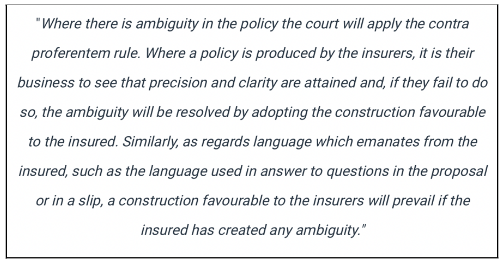
The Apex court said aside from the order of NCRDC and directed the insurer to pay the claim amount of Rs. 2.45 crores with the interest of 9% per annum.
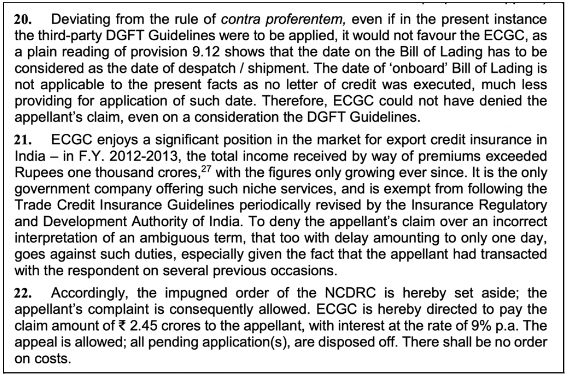
Delhi HC: Husband having sufficient means cannot shirk away from familial responsibility
In the case of Jitendra Kumar Garg vs. Manju Garg, Delhi High Court observed that as per section 125 of the Code of Criminal Procedure, if the husband has sufficient means, he is obligated to maintain his wife and children and not shirk away from the responsibilities.
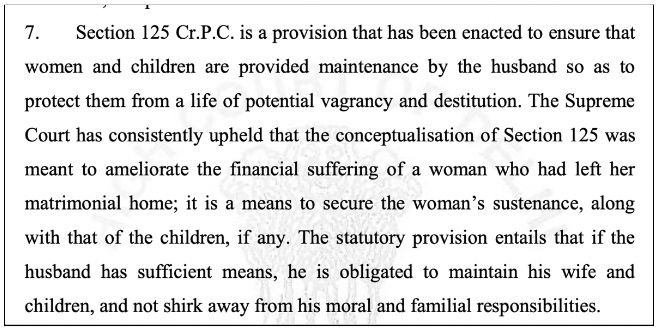
In this case, presided by Justice Subramonium Prasad, the Delhi High Court was dealing with a plea challenging an order passed by the Family Court, where the petitioner i.e., the husband was directed to pay interim maintenance of Rs. 20 thousand per month to the respondent i.e., wife.
The Sequence of events of the case are.
- Both the parties were married in 1989 and have two sons. Matrimonial disputes arose in 2013 and it was alleged that the wife treated the husband with cruelty.
- Subsequently, they both started living separately, the husband staying with the elder son and the wife with the younger.
- In December 2015, the wife allegedly forcibly entered the property of the husband and started living in a portion of the house. A settlement was reached in 2018 where the husband agreed to pay the wife Rs. 5 thousand per month.
- Later in December 2018, the wife filed a petition along with an application for interim maintenance and alleged that she was treated with cruelty. She also alleged that the husband earns Rs. 3 lakhs per month. This was contested by the husband citing that he was an auto driver and the wife herself earns Rs. 40 thousand per month.
- As per the Mediation Settlement in 2020, it was agreed that the husband would continue to give Rs. 5 thousand per month to his wife. This was impugned by the Family court, and it directed the husband to pay Rs. 20 thousand per month.
The husband filed a petition in the High Court challenging the order. The high court observed that it can only interfere in the impugned order if it was replete with legal infirmities. Reviewing the documents, the court noted that the order issued by the Family court was based on considering all the affidavits of income, assets & liabilities etc. It concluded that the impugned order by the Family court was well-reasoned and hence dismissed the petition filed by the husband.
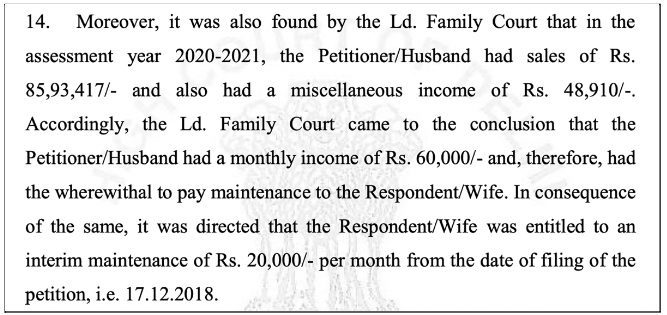
Kerala HC: Drops charges in an ‘Attempt to Suicide’ case
In an attempt to suicide case, Justice K. Haripal of Kerala High Court observed that based on an elaborate study of general judicial opinion on attempts to suicide, the growing trend is in favour of decriminalization of the offence as suicidal behaviour is often considered to be a symptom of mental distress.
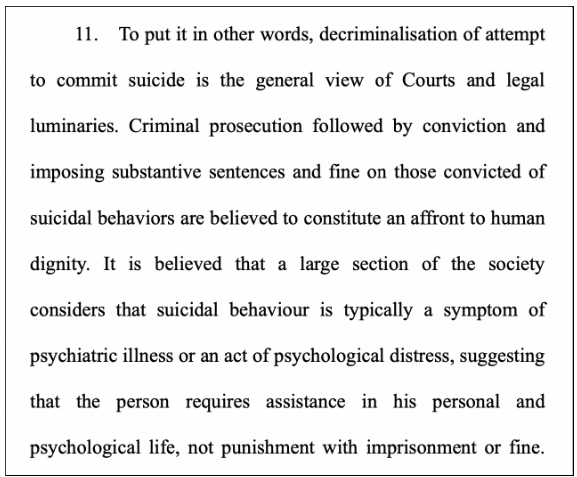
Accordingly, in the case of Simi C.N. vs. State of Kerala & Ors., the Kerala High Court quashed all the charges that were pending against a Village officer who attempted suicide and was booked under IPC Section 309. She moved the court to quash the proceedings against her.
The de facto complainant (president of the village) and others demanded the issuance of income certificates related to the ‘Life Mission Scheme’ manually. The petitioner i.e., the village officer insisted that she will issue the certificates manually only after getting instructions from higher officials. The official procedure is to issue these certificates online.
This led to an altercation at the office. The officer attempted suicide due to the mental turmoil caused. In the petition, she stated that the group had wrongfully restrained and confined her and obstructed the normal course of work and stated their political clout. The group has abused, harassed, and ridiculed her in front of the general public.
Amidst the harassment and mental strain, she took out a blade and cut the veins of her left arm and was immediately taken to a hospital. Advocates on behalf of the petitioner submitted that she indulged in such an act without any intention and out of the circumstances and cannot attract offence under Section 309. Further, section 115 of the Mental Care Act saves the criminal liability of the petitioner.
Looking at the facts of the case, the court observed that there was no allegation from the panchayat president or others that the petitioner adopted any corrupt practice or has purposefully delayed issuing certificates. The charge sheet also stated that she attempted suicide by cutting the veins out of mental strain.
Justice Harpal referred to the Law Commission’s 42nd report’s recommendation on the deletion of the offence of attempt to commit suicide from the IPC. Furthermore, in the case Common Cause vs. Union of India & Anr, Supreme Court has recommended the parliament consider decriminalizing attempts to suicide.
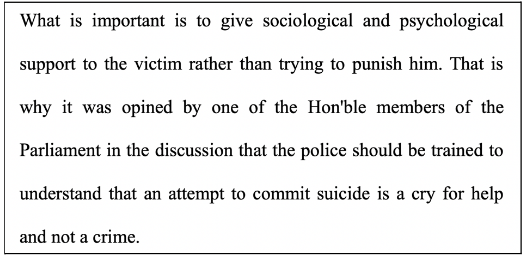
In view of the situation created by the president and others who seem to obtain certificates by frightening her, it can be understood that the Village officer was under severe stress. The court, therefore, proceeded to quash all the pending proceedings against her.
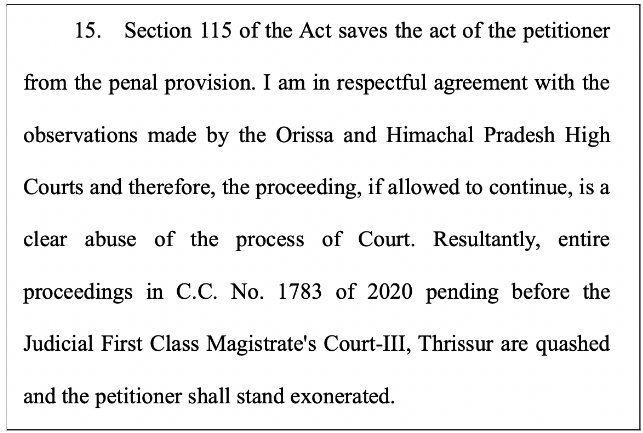
Delhi HC: Use of Registered Mark by competitors as Keyword in Google Ads is an infringement of Trademark.
In the case of Make My Trip India Pvt Ltd vs. Booking.com B.V & Ors, the Delhi High Court observed that the use of the registered trademark by competitors even as metatag is an infringement under Trademarks Act and granted an injunction in favour of ‘Make My Trip’.
The Plaintiff – ‘Make My Trip (India) Pvt. Ltd’ had filed the suit for permanent injunction which sought the protection of its registered trademarks “MakeMyTrip” and its variants. The petitioner alleged that their trademarks were being used by Booking.com B.V as keywords on the Google Ads for promoting their services through the search results displayed on the Google search engine. When the search is being carried out for ‘Makemytrip’ in Google search, the first advertisement which is displayed is of Booking.com, which is among its major competitors.
Makemytrip.com also claimed that Booking.com has made bids for the keyword “MakeMyTrip to ensure that they are displayed in the top search results when someone searches for “MakeMyTrip” on Google. The plaintiff has earlier issued notices to Booking.com asking them to cease bidding on the keyword “MakeMyTrip”, which was duly stopped. Further notices were issued asking the defendant to cease the unauthorized and illegal bidding for their trademark as a keyword.
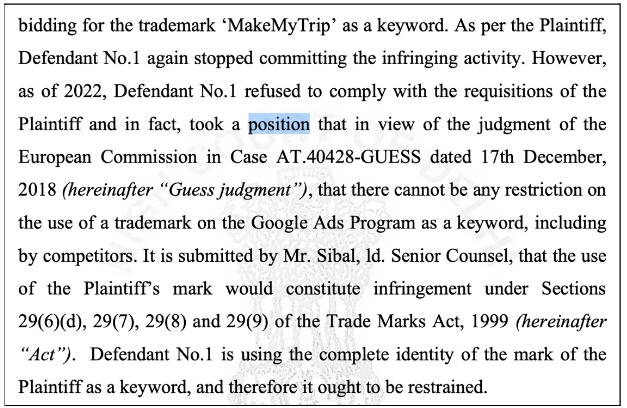
The defendant i.e., Booking.com argued that the plaintiff has not disclosed complete details. Reference was made to a ‘Strategic Partnership Agreement’ in 2016 between the two parties wherein Booking.com permitted Makemytrip to conduct, undertake, use, and perform paid searches using their mark “booking.com”. They further stated that the worlds ‘make”, “my”, and “trip” can be used in a generic and descriptive manner. It was also argued that the use of a trademark as a keyword is not an infringement internationally including the UK, USA, EU, Australia, Japan, China etc.
The court observed that by using a registered trademark as a keyword, Google Ads seeks to create a platform for two competitors to bid against each other. Therefore, the trademark owner is being forced to bid for its own trademark.
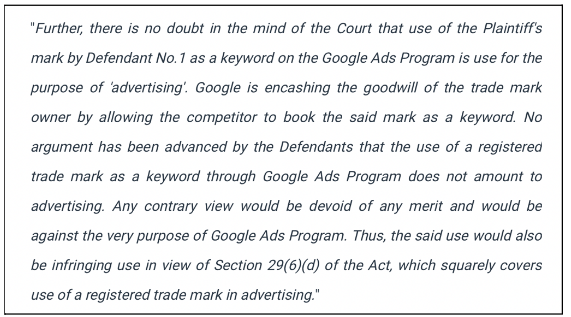
The court restrained Booking.com to use the mark “MakeMyTrip”, together or in conjunction, with or without spaces as a keyword on Google Ads.
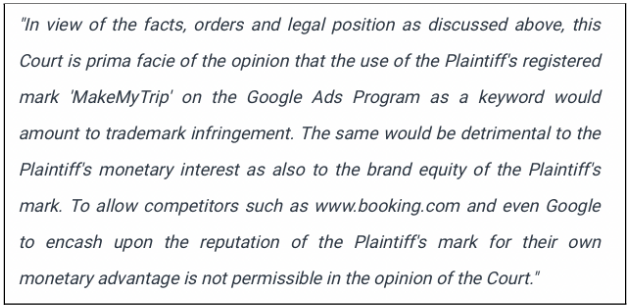
Featured Image: Important Court Judgements


